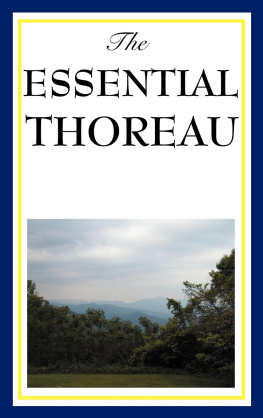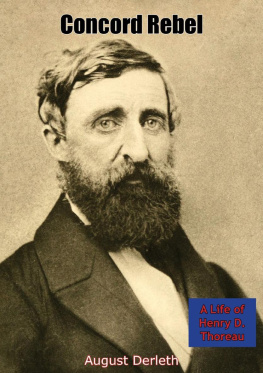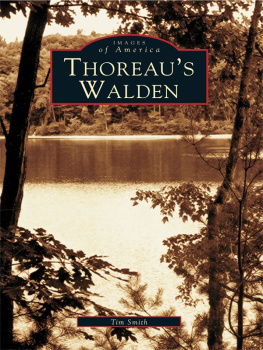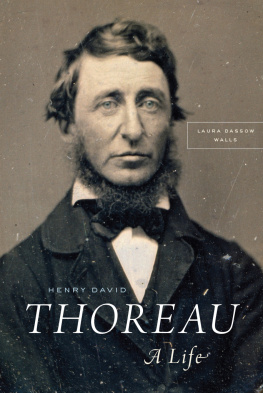I do not propose to write an ode to dejection, but to
brag as lustily as chanticleer in the morning, standing
on his roost, if only to wake my neighbors up.
HENRY D. THOREAU
Walden
1 5 0 TH A N N I V E R S A R Y E D I T I O N
E D I T E D B Y J. L Y N D O N S H A N L E Y
W I T H A N I N T R O D U C T I O N
B Y J O H N U P D I K E
P R I N C E T O N U N I V E R S I T Y P R E S S
P R I N C E T O N A N D O X F O R D
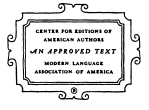
The Center emblem means that one of a panel of textual experts serving the Center has reviewed the text and textual apparatus of the original volume by thorough and scrupulous sampling, and has approved them for sound and consistent editorial principles employed and maximum accuracy attained. The accuracy of the text has been guarded by careful and repeated proofreading of printers copy according to standards set by the Center.
Copyright1971, 2004 by Princeton University Press, 41 William Street, Princeton, New Jersey 08540 In the United Kingdom: Princeton University Press, 3 Market Place, Woodstock, Oxfordshire OX20 1SY
All Rights Reserved
First edition, 1971
150th Anniversary Edition, 2004
Library of Congress Cataloging-in-Publication Data has been applied for
ISBN-13: 978-0-691-09612-4 (pbk.)
ISBN-10: 0-691-09612-0 (pbk.)
British Library Cataloging-in-Publication Data is available
Printed on acid-free paper.
pup.princeton.edu
Printed in the United States of America
10 9 8 7 6 5
Editorial Board
Editor-in-Chief, Elizabeth Hall Witherell
Executive Committee
William L. Howarth
Robert N. Hudspeth
Joseph J. Moldenhauer, Textual Editor
William Rossi
Nancy Craig Simmons
The Writings
Walden, J. Lyndon Shanley (1971)
The Maine Woods, Joseph J. Moldenhauer (1972)
Reform Papers, Wendell Glick (1973)
Early Essays and Miscellanies, Joseph J. Moldenhauer et al. (1975)
A Week on the Concord and Merrimack Rivers, Carl F. Hovde et al. (1980)
Journal 1: 1837-1844, Elizabeth Hall Witherell et al. (1981)
Journal 2: 1842-1848, Robert Sattelmeyer (1984)
Translations, K. P. Van Anglen (1986)
Cape Cod, Joseph J. Moldenhauer (1988)
Journal 3: 1848-1851, Robert Sattelmeyer, Mark R. Patterson, and William Rossi (1990)
Journal 4: 18511852, Leonard N. Neufeldt and Nancy Craig Simmons (1992)
Journal 5; 18521853, Patrick F. OConnell (1997)
Journal 6: 1853, William Rossi and Heather Kirk Thomas (2000)
Journal 8: 1854, Sandra Harbert Petrulionis (2002)
The Higher Law: Thoreau on Civil Disobedience and Reform, Wendell Glick (2004)
Contents
Introduction
A CENTURY and a half after its initial publication, Walden has become such a totem of the back-to-nature, preservationist, anti-business, civil-disobedience mind-set, and Thoreau so vivid a protester, so perfect a crank and hermit saint, that the book itself risks being as revered and unread as the Bible. Of the American classics densely arisen in the middle of the nineteenth centuryHawthornes Scarlet Letter (1850), Melvilles Moby-Dick (1851), Whitmans Leaves of Grass (1855), to which we might add Harriet Beecher Stowes Uncle Toms Cabin (1854) as a nation-stirring best-seller and Emersons essays as an indispensable preparation of the groundWalden has contributed most to Americas present sense of itself. In a time of informational overload, of clamorously inane and ubiquitous electronic entertainment, and of a fraught, globally challenged, ever more demanding workplace, the urge to build a cabin in the woods and thus reform, simplify, and cleanse ones lifeto front, in Thoreaus ringing verb, only the essential facts of liferemains strong. The vacation industry, so-called, thrives on it, and camper sales, and the weekend recourse to second homes in the northern forests or the western mountains, where the pollutions of industry and commerce are relatively light. Simplify, simplify, Walden advises, and we try, even though a twenty-first century attainment of a rustic, elemental simplicity entails considerable complications of budget and transport.
Thoreau would not scorn contemporary efforts to effect his gospel and follow his example. Walden aims at conversion, and Thoreaus polemical purpose gives it an energy and drive missing in the meanders of the sole other book he saw into publication during his short lifetime, A Week on the Concord and Merrimack Rivers (1849). Like A Week, Walden is a farraginous memoir, and was subject to Thoreaus habit of constant revision and expansion, going through seven known drafts, but it all forms a defense of his eccentric reclusion. A vigorous, humorous tone asserts itself at the outset:
I should not obtrude my affairs so much on the notice of my readers if very particular inquiries had not been made by my townsmen concerning my mode of life, which some would call impertinent, though they did not appear to me at all impertinent, but, considering the circumstances, very natural and pertinent.
The circumstances, a malaise of drudgery and petty distraction in the society around him, are described, and his general wish to live deliberately, to front only the essential facts of life, and see if I could not learn what it had to teach, and not, when I came to die, discover that I had not lived. However, he passes over a very practical motive: he wanted to be a writer and, like many another of like ambition, needed privacy, quiet, and a broad margin where his mind could roam.
He built a single-room cabin on his mentor Emersons land, more than a mile south of Concord village, in the spring of 1845, and moved in on July 4, declaring his own independence. In the next two years he completed a draft, later expanded, of A Week on the Concord and Merrimack Rivers, based on a canoe trip he and his brother John had taken in 1839, as well as composing the first draft of Walden and a long essay on Thomas Carlyle, part of which he gave as a lecture at the Concord Lyceum in 1846. In July of 1846 he refused to pay his accumulated town poll taxes, on the grounds that the national government condoned and protected slavery, and spent one night in jail, thus laying the basis for his celebrated essay Civil Disobedience. Later in that same year he travelled for the first time to Maine and wrote most of the essay Ktaadn. Thoreau was twenty-seven when he took up residence in the cabin by Walden Pond; he had graduated from Harvard nineteenth in his class, tried teaching, helped his father in the family pencil business, did local odd jobs for a dollar a day, lived with the Emersons for two years as handyman and gardener, left Long Island after a brief spell of tutoring and testing the literary market, and, despite Emersons sponsorship and a few poems and essays in the Transcendentalist quarterly The Dial, had made no mark. He emerged from the cabin in 1847 as essentially the Thoreau known to literary history.
His appearance was sufficiently arresting to have attracted a number of descriptions. The fastidious but not unfriendly Hawthorne, a sometime resident of Concord, described him in 1842 as a young man with much of wild original nature still remaining in him. He is as ugly as sin, long-nosed, queer-mouthed, and with uncouth and somewhat rustic, although courteous manners. [He] seems inclined to lead a sort of Indian life among civilized menan Indian life, I mean, as respects the absence of any systematic effort for a livelihood. James Kendall Hosmer recalled how an older Thoreau stood in the doorway with hair which looked as if it had been dressed with a pine-cone, inattentive grey eyes, hazy with faraway musings, an emphatic nose and disheveled attire that bore signs of tramps in woods and swamps. His New Bedford disciple Daniel Ricketson recalled, as phrased by Thoreaus biographer Walter Harding, the gentleness, humanity, and intelligence of Thoreaus blue eyes and noted that though his arms were long, his legs short, his hands and feet large, and his shoulders markedly sloping, he was strong and vigorous in his walk. His voice was impressive, even toward the end, when tuberculosis had weakened it. On his last journey, a rather desperate excursion to Minnesota for the possibly healing effects of its supposedly drier climate, the minister upon whom he called in Chicago, the Unitarian Robert Collyer, remembered:




